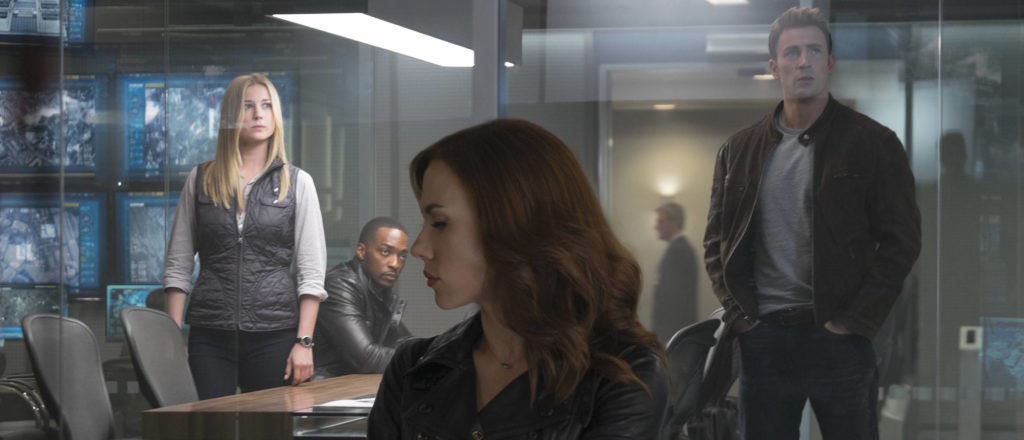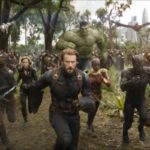The portrayal and treatment of Black Widow, aka Natasha Romanoff, has been one of the most critiqued aspects of the MCU. She was introduced in Iron Man 2 as a personal assistant at first. We later find out she’s a S.H.I.E.L.D. agent sent to protect Tony Stark. Going from eye candy to badass who doesn’t talk much makes sense in this case given the circumstances and the story that’s being told.
In The Avengers, she’s still used as a spy and manipulator. Widow is a bit more stiff and direct this time around since she’s not playing a role. She’s very cold and stoic, which is in line with part of her personality in the source material. But there’s a point where she’s having a heart-to-heart with Hawkeye after he’s freed of his mind control from Loki. It’s the first time we’ve seen her softer side and realize that there’s more this super-spy.
Out of the group, she received the least amount of character development, while characters who were featured in previous films get more. Which is weird when you realize that she’s third place by Captain America when it comes to screen time in the film. This affirms that quantity does not mean quality.
Unfortunately, she’s not fleshed out more in Avengers: Age of Ultron even though we get that touching moment with the Bartons. Whedon decided to throw Natasha and Banner into a relationship that, on the surface level, is okay but fundamentally makes no sense because there’s no real explanation provided. On top of that, you have some messy dialog and background tidbits that didn’t sit right with many people.
Enter The Russo Brothers
Captain America: The Winter Soldier was the Russos’ first Marvel film. It introduced Sam Wilson, aka Falcon (played by Anthony Mackie). This film was used to develop Cap’s most important relationships. In addition to Sam, it introduced Sharon Carter and featured the return of Bucky Barnes as the Winter Soldier.
Widow serves several purposes in this film. She’s somewhat of a moral foil to the naïve Captain America. Cap is a soldier with a code who is thrown into this world of spycraft and wet work. All this while coping with the fact that his best friend is alive as the brainwashed Winter Soldier. She’s also Cap’s guide through this new world of espionage that he’s found himself in. The morally rigid Steve Rogers isn’t used to having friends who either omit details or outright lie to him. But these numerous conflicts serve to strengthen their bond that will carry over for several films.
Captain America: Civil War
In Captain America: Civil War, she switches sides and thwarts Black Panther’s efforts to apprehend Steve and Bucky. Her scenes are some of the most important ones in the film. She’s present during the botched mission to capture Crossbones. Widow’s the first Avenger whom T’Challa meets, and she’s present during the bombing that would kill his father. She’s also the most diplomatic character in the story. Widow balances the needs of several parties while making sure the only family she has doesn’t implode. Eventually, she chooses the side that makes the most sense to her. She does so much that gets overlooked due to Stark and Rogers’s posturing.

Infinity War and Endgame
The events of Civil War forced those who aligned themselves with Rogers to either go underground or, in the case of Hawkeye and Ant-Man, house arrest. Because Infinity War primarily focused on Thanos and the events that would lead to Avengers: Endgame, there is little time spent on the character development of the heroes. There’s an exchange in the first act where Natasha gets on Wanda and Vision’s case for not checking in when they were supposed to. She’s genuinely worried about them getting caught.

After the snap occurs in Infinity War, and even during most of the first arc of Endgame, she’s still holding it together. The five-year time jump in Endgame is where Scarlett Johansson’s portrayal of Black Widow truly shines and is one of the best performances of her career. The Bartons and the Avengers were her only family. The events of Civil War and Infinity War have stripped her of both. This is the first time you see the character run the full gamut of emotions.
Natasha is a character who is always well-dressed and manicured, even when on missions. One of the first things you notice after the time jump is the condition of her hair. Scarlett Johansson does an excellent job communicating Natasha’s pain through nervous mannerisms and facial expressions ranging from anxious to immeasurable pain. You can hear the desperation in her voice when she asks Rhodey to assist in her search for Clint, who has been engaged in a one-man war on crime since he lost his family to Thanos. And when Scott Lang presents a possible solution to everyone’s problems, you can tell she NEEDS this to work.
When the team lays out their plan in act two, it’s obvious to the audience who will be sent after the Soul Stone. But that doesn’t take away from the impact of her sacrifice. Some would debate that it should have been Clint to take the plunge. The problem with that is there isn’t a scenario where Natasha would let Clint make that decision. It makes the most sense for the trajectory of her character arc and her established personality.
Black Widow’s arc is among the best in the MCU, but the amount of work that was done in a single film highlights how underutilized she was. The fact that she didn’t get an onscreen memorial service sums up the overall treatment of the character. On the positive side, we got to see Johansson’s best acting since Lost in Translation. Hopefully, Widow will be the only character treated this way. After the announcement of a Shang Chi film being developed, and the creative choices being made for The Eternals film, Marvel Studios is obviously serious about fixing their diversity problem.

![[REVIEW] HELM GREYCASTLE #1](https://geekd-out.com/wp-content/uploads/2021/04/Helm-Greycastle-1-alt-cover-150x150.jpg)

